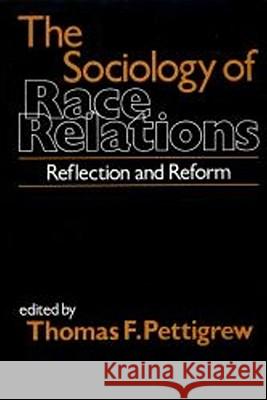The Sociology of Race Relations » książka
The Sociology of Race Relations
ISBN-13: 9780029251102 / Angielski / Miękka / 1980 / 480 str.
These readings chronicle the triumphs and failures of race relations in our nation, unfolding the tensions and struggles of racial conflict through the analyses of sociologists writing since the late nineteenth century. The forty-five articles gathered here are drawn from four of the most respected journals in the field: "American Journal of Sociology," "American Sociological Review," "Social Forces," and "Social Problems." Together, they document the problem of the 'color-line', providing for various eras the contemporary rationale for the status quo as well as farsighted calls for change. Thus, the readings reveal how sociological thought reflected racial tensions in this century while simultaneously serving as a force for reform. "The Sociology of Race Relations" covers seven historical periods, each introduced by an incisive discussion of the racial milieu of the time. It begins with the era of Jim Crow laws and the great black migration from the South and proceeds to the reappearance of the Ku Klux Klan in the '20s, the Depression years, the Japanese-American internment during the Second World War, the deceptively quiet '50s that culminated in the civil rights movement of the '60s. It concludes with a look at desegregation in the '70s, the aftermath of the policies of the preceding decade. Although the majority of selections deal with the problems of black Americans, articles on Mexican-Americans and Japanese-Americans as well as on prejudice in general broaden the scope of the book. The editor's introduction places the entire volume in historical and sociological context. A time capsule for viewing race relations, and the development of sociological understanding of race relations, "The Sociology of Race Relations" illustrates two of the discipline's major contributions to American life: its ability to heighten our sensitivity to unnoticed relationships and to debunk simplistic beliefs.
These readings chronicle the triumphs and failures of race relations in our nation, unfolding the tensions and struggles of racial conflict through the analyses of sociologists writing since the late nineteenth century.
The forty-five articles gathered here are drawn from four of the most respected journals in the field: "American Journal of Sociology", "American Sociological Review", "Social Forces", and "Social Problems". Together, they document the problem of the color-line, providing for various eras the contemporary rationale for the status quo as well as farsighted calls for change. Thus, the readings reveal how sociological thought reflected racial tensions in this century while simultaneously serving as a force for reform.
"The Sociology of Race Relations" covers seven historical periods, each introduced by an incisive discussion of the racial milieu of the time. It begins with the era of Jim Crow laws and the great black migration from the South and proceeds to the reappearance of the Ku Klux Klan in the 20s, the Depression years, the Japanese-American internment during the Second World War, the deceptively quiet 50s that culminated in the civil rights movement of the 60s. It concludes with a look at desegregation in the 70s, the aftermath of the policies of the preceding decade. Although the majority of selections deal with the problems of black Americans, articles on Mexican-Americans and Japanese-Americans as well as on prejudice in general broaden the scope of the book. The editors introduction places the entire volume in historical and sociological context.
A time capsule for viewing race relations, and the development of sociological understanding of race relations, "The Sociology of Race Relations" illustrates two of the disciplines major contributions to American life: its ability to heighten our sensitivity to unnoticed relationships and to debunk simplistic beliefs.











